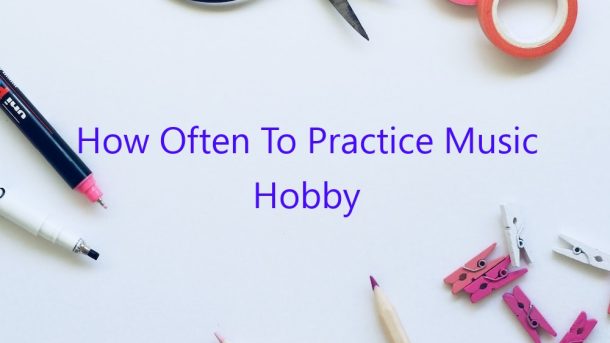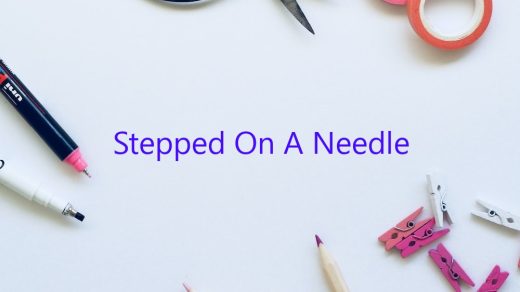How often should you practice your music hobby? This is a question that a lot of people ask, and it’s not an easy question to answer. There are a lot of variables involved, including the type of music you play, your skill level, and how much practice you need to reach your goals.
Generally speaking, the more you practice, the better you’ll become. If you’re a beginner, you may need to practice for 30 minutes to an hour each day to see progress. If you’re an experienced musician, you may only need to practice for 10 or 20 minutes per day to maintain your skills.
There is no one “right” answer to this question – it depends on your individual needs and goals. However, it’s important to be consistent with your practice schedule, and to make sure that you’re practicing effectively.
Here are a few tips for practicing your music hobby effectively:
1. Make a practice plan.
If you’re not sure how much practice you need, or what you should practice, make a practice plan. This will help you stay organized and make the most of your practice time.
2. Practice regularly.
It’s important to practice regularly, especially if you’re a beginner. If you only practice once a week, you won’t see as much progress as if you practice every day.
3. Practice slowly.
It’s important to practice slowly at first, so that you can get the hang of the new skill or piece of music. Once you have the basics down, you can start practicing more quickly.
4. Practice mindfully.
When you practice, focus on the task at hand and don’t let your mind wander. This will help you learn the new skill or piece of music more quickly.
5. Practice with a goal in mind.
When you practice, always have a specific goal in mind. Whether you want to improve your technique, learn a new piece of music, or practice a specific skill, always have a goal in mind.
6. Practice in a comfortable place.
Make sure that you practice in a place that’s comfortable and that won’t distract you. If you’re practicing at home, make sure that you have a quiet, distraction-free space to work in.
7. Take breaks.
Don’t practice for hours on end – take breaks to stretch, eat, and drink water. This will help you stay focused and energized during your practice session.
8. Be patient.
It takes time and practice to improve your music skills. Don’t get discouraged if you don’t see progress immediately – be patient and keep practicing.
practicing your music hobby is important, and it can be a lot of fun too. Just make sure to practice regularly, focus on your goals, and be patient. You’ll see progress in no time!
Contents
How many hours a day should I practice music?
How many hours a day should I practice music? This is a common question asked by musicians of all skill levels. The amount of practice time you need to achieve your musical goals depends on a variety of factors, including your skill level, the type of music you are playing, and how much you enjoy practicing.
In general, the more you practice, the better you will become. However, it is important to find a balance between practicing enough to make progress and practicing so much that you become burned out. As a beginner, you may need to practice for several hours each day to develop basic skills. As you become more advanced, you may need to practice for fewer hours each day, but you will still need to practice regularly to maintain your skills.
How you practice is also important. If you practice the same piece of music for hours on end, you will likely become bored and will not make much progress. Instead, try practicing different pieces of music, or practicing different aspects of your playing. If you are practicing correctly, you should be able to play a piece of music fluently after a few minutes of practice.
In general, you should practice music for as long as you enjoy it. If you are practicing for hours on end and you are no longer enjoying it, you are probably practicing too much. Try taking a break, or switch to a different type of music to keep things interesting.
Ultimately, the amount of practice time you need depends on you and your individual goals. However, in order to improve your playing, you will likely need to practice regularly and for extended periods of time.
How many hours a week should I practice music?
How many hours a week should I practice music?
There is no one definitive answer to this question. It depends on your skill level, your goals, and how much time you have available.
If you are a beginner, you should probably start by practicing for 10 or 15 minutes a day. As you become more skilled, you can gradually increase your practice time. If you are aiming to become a professional musician, you may need to practice for several hours a day.
It’s important to be realistic about how much time you can devote to practice. Don’t set yourself up for failure by trying to practice too much. Instead, try to find a balance between practicing enough to improve your skills and practicing in a way that doesn’t feel like a chore.
Whatever your goal, be patient and consistent in your practice. Over time, you will see improvements in your musicianship.
How much music practice is too much?
How much music practice is too much?
This is a difficult question to answer because it depends on the individual. Some people might be able to practice for hours every day and not experience any problems, while others might only be able to practice for a limited amount of time before they start to experience negative side effects.
There is no definitive answer to this question, but here are some things to consider:
1. Too much practice can lead to overuse injuries.
2. It can also lead to burnout and fatigue.
3. It can cause tension and stress, which can lead to physical and emotional problems.
4. It can cause students to lose sight of the big picture and become obsessed with the details.
5. It can lead to perfectionism and a need for constant approval from others.
6. It can cause students to lose interest in other activities and isolate themselves from others.
7. It can cause students to develop unhealthy habits, such as eating disorders or drug and alcohol abuse.
8. It can lead to depression and anxiety.
There is no right or wrong answer to this question. It is up to each individual to decide how much practice is right for them. It is important to listen to your body and take breaks when necessary. If you start to experience any of the negative side effects listed above, you might want to consider reducing your practice time.
When should you practice music?
There is no one answer to the question of when you should practice music. It depends on your goals, your schedule, and your level of experience. However, there are some general guidelines that can help you make the most of your practice time.
If you want to become a professional musician, you will need to practice for hours each day. However, even amateur musicians can benefit from regular practice. In order to make the most of your practice time, you should schedule regular sessions and make a commitment to stick to them.
Morning is generally the best time to practice, because your mind and body are fresh. However, if you are not a morning person, afternoon or evening sessions may work better for you. It is important to find a time of day when you are able to focus and concentrate on your practice.
When you practice, make sure you are completely focused. Turn off your phone, close your door, and avoid distractions. Dedicate yourself to your practice time and make the most of it.
Practice regularly and you will see improvements in your playing. Make a commitment to your practice time and you will be rewarded with better musicianship and a deeper understanding of your instrument.
Should you practice music everyday?
For musicians, the answer to the question of whether or not to practice every day is an unequivocal “yes!”
Practicing music every day is the key to developing your skills as a musician. If you want to be the best musician you can be, you need to practice every day.
There are many benefits to practicing music every day. First, daily practice will help you improve your musicianship. You will get better at playing your instrument, reading music, and understanding theory.
Second, daily practice will help you develop a strong practice routine. A good practice routine is essential for improving your musicianship.
Third, daily practice will help you stay motivated. Sticking to a daily practice routine can be difficult, but it is worth it in the long run.
Fourth, daily practice can help you form good habits. Habits are important for musicians, as we need to be able to play our instruments flawlessly in order to perform well.
Finally, daily practice can help you find your “practice voice.” The practice voice is the voice you use when you are practicing. It is different than the voice you use when you are performing. Practicing with your practice voice will help you sound better when you perform.
So, should you practice music every day? The answer is yes! Practicing music every day is the key to becoming a better musician.
Is 2 hours violin practice a day enough?
Whether you are just starting out on the violin or have been playing for years, it is important to practice regularly in order to improve your playing. How much practice is enough, however, is a question that many musicians ask themselves.
In general, most experts agree that you need to practice at least 30 minutes a day in order to see results. If you are able to practice for longer, that is great, but 30 minutes should be your minimum goal. The more you practice, the better you will become, but there is such a thing as over practicing, so be careful not to overdo it.
If you are able to practice for 2 hours a day, that is great, but it is not necessary. You will see results with practice times of 30 minutes or even less. If you are practicing effectively, you should be able to see improvement in your playing even with shorter practice times.
Some people may be able to practice for more than 2 hours a day and still not over practice, but this is not the norm. Most people need to practice for shorter periods of time in order to see results.
So, is 2 hours of practice a day enough? It depends on the person. Some musicians may need more than 2 hours a day to see results, while others may be able to achieve the same results with less practice time. The key is to find what works best for you and to stick to a practice routine that you can maintain.
How can I practice music regularly?
If you want to become a great musician, you need to practice regularly. But practicing can be difficult – especially if you don’t have a lot of time. Here are a few tips on how can you practice music regularly, even if you’re short on time.
1. Find a practice routine that works for you.
There’s no one right way to practice music. Some people prefer to practice every day, while others prefer to practice for shorter periods of time more frequently. Experiment until you find a routine that works for you.
2. Set goals for yourself.
It can be helpful to set goals for yourself when you practice. This can keep you motivated and help you stay on track.
3. Practice a variety of pieces.
Don’t just focus on your favorite pieces. Try practicing a variety of pieces, from classical to jazz to rock. This will help you improve your overall musicianship.
4. Use a metronome.
A metronome can be a helpful tool for practicing. It can help you keep time and make sure you’re playing at the correct tempo.
5. Take breaks.
Don’t practice for hours on end. Breaks are important, both for your mental and physical health. Get up and move around, take a few deep breaths, and give your mind a break.
6. Practice in a quiet place.
If you can, try to find a quiet place to practice. This will help you focus better and avoid distractions.
7. Practice regularly.
The best way to improve your music skills is to practice regularly. Try to set aside a certain amount of time each day or week to practice.




